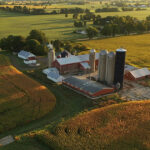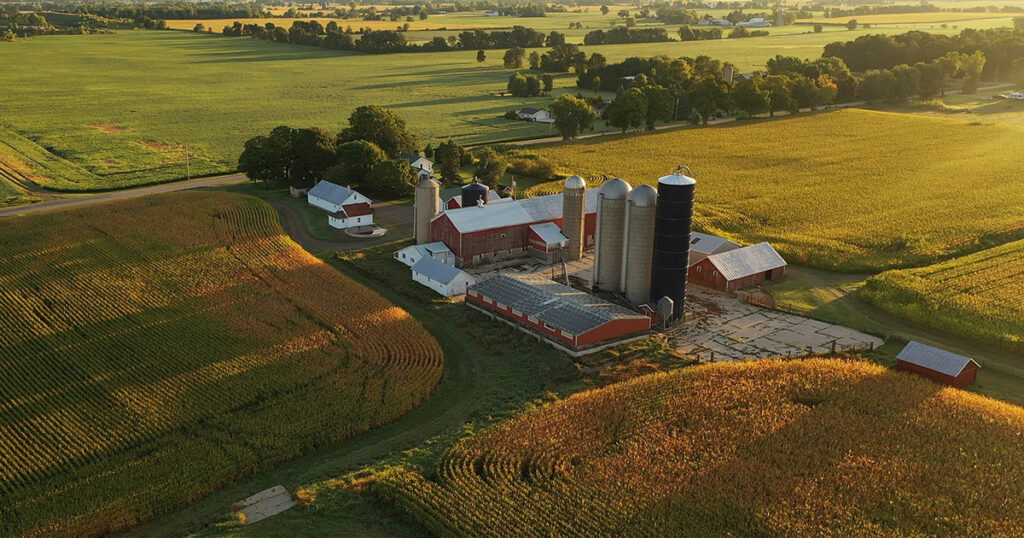Fall Weather on Land
As autumn begins, the temperature drops, leaves start to fall and land owners must take the proper precautions to prepare for the colder months. Monitor how these elements alter your pastures, timber, water sources and other aspects of your land. Being aware and on top of the changes to your property helps you protect your land investment.
Crop Yields
Crop growth falls naturally as temperatures drop after harvest in the fall. Factors such as moisture levels and when the first frost or snow occurs can heavily influence the outcomes of crops. Naturally, temperatures and sun exposure affect different crops in various ways, so understanding each plant’s optimal conditions for growth and reproduction alter their abilities to thrive in the fall and winter. Carbon dioxide plays a large part in the success of crops as well. Higher amounts can help some plants grow faster if all other needs are being met, but CO₂ can also cause unpredictable and negative effects if the crop doesn’t have proper water and nutrients provided.
Pasture Management
Fall and winter also signal a shift in pasture management practices as grass growth declines. This change in production can affect livestock’s feeding habits, so switching to supplement feed options is often the best practice for farmers. Closely following the recommended pasture rotation and stock rates for your land will prevent overgrazing and long-term damage to pastures and plains. Maximize forage use as winter approaches to help develop a sustainable plan to keep your land healthy and reduce the need for costly supplement feed.
Soil Moisture & Erosion
The moisture in soil expands when it colds, which can cause a lot of damage to crops, sidewalks and other infrastructure. A frost layer, the outer layer of soil with water that becomes frozen, can be harmful yet easily managed. Additional organic matter like leaves, mulch or compost can prevent this by adding a ‘blanket’ to protect the ground. If your area sees a lot of snow, a snow blanket can also act as an insulator for the soil, covering it completely and preventing heat and moisture from getting out.
Forestry & Woodlands
If forests or woodlands are on your property, autumn is a critical time to manage these grounds. Fallen leaves, increases in moisture and seasonal pests can cause extreme issues to your forest or tree’s health. Thinning the trees, managing the underbrush and removing dead plants can dramatically improve the woodland’s regeneration abilities, allowing forests to prosper in the winter. Consulting with a timberland expert or forestry consultant who can provide insight on timber cutting and regeneration is recommended for all land owners with forests.
Wildlife & Hunting Considerations
Fall is prime hunting season, requiring more careful consideration from recreational and hunting property land owners. The cooler weather changes the behavior of wildlife, especially deer, turkey and other game as they are more active during the day to prepare for the coming winter. Ensure your land is ready for hunts by strategically placing food plots and habitats throughout your acreage, attracting more life and enhancing your hunting prospects.
When hunting in the fall, be sure to look at the forecast as sudden weather changes are common during the fall and can alter hunting abilities, such as shifts in wind direction or heavy rains.
Fall Weather on Livestock
Sheltering Needs
Cold weather, snow, rain and wind can all have dramatic impacts of livestock’s quality of life, so make sure you build and provide appropriate shelter. Stall barns, chicken coops, metal barns or even loose housing are all viable options, depending on your livestock and climate. During the early days of fall, make sure all structures are insulated, restored and well-maintained to last through the winter.
Feeding Adjustments
Adjust feeding schedules for your livestock in the winter to better support their nutrition and body temperature. Consult your veterinarian to determine what levels are appropriate for your particular livestock species and weather habits. A lot of times, cattle, horses, sheep and other cloven animals, as well as poultry, require more food compared to summer months.
Water Supply
Your water sources, like lakes, ponds and streams, may freeze or drop in temperature, hindering your livestock’s ability to obtain enough hydration to keep them healthy through the winter. If you solely rely on live and natural water sources, provide an alternative resource that won’t be affected by the cold air or frequently check the source to ensure it doesn’t get tool cold or freeze over.
Livestock Thermoregulation
Livestock regulate temperatures very differently from humans. Cattle tolerate cold weather conditions relatively well, but still reactive negatively to too wet or windy weather. Transportation can cause further stress as well, requiring alternative methods and careful consideration.
Signs of Weather Stress
Identifying weather stress in your livestock’s behavior and appearance early on is key to keeping them happy and healthy. Signs of stress include changes in eating patterns, lethargy, shivering and other odd behaviors.
Impacts on Fishing
Fishing is a major selling point for landowners with lakes, ponds, creeks or ocean access. The autumn and winter months freeze and cool down the water, making the fish move slower and consume less food. The turbidity of the water when it starts raining or the wind disrupts the water can bring fresh challenges to fishing.
Best Practices for Landowners Preparing For Fall
Preparing your land and livestock for the challenges of fall can reduce risks and damages to your property, ensuring your assets deliver a productive winter.
Assess Your Land
Assess your land by walking or driving around before the cold weather sets in. Trek your acreage to identify any areas of concern such as erosion, damaged fencing, structure issues, dead plant debris and areas needing mulching. Getting these tasks done in fall is perfect to allow for more time to plana and implement the necessary repairs.
If you are in need of consultation, UCRE has the largest network of land professionals that happily provide valuable insight on how to conduct comprehensive land assessments.
Stock Up On Supplies
Stock up on supplies for yourself, your crops and your livestock before snowfall or winter winds begin. Whether its feed, medical supplies, mulch or water, make sure you are well prepared for any scenario if big snows and sub-zero temperatures are common in your area. Unpredictable and extreme weather can make it difficult to access supplies quickly, especially in more rural regions.
Fall and winter weather can present challenging times to land owners, farmers and ranchers. From drastic temperature changes to unpredictable snow storms, these cold seasons demand careful preparation and adaptation to prevent damage to livestock and land assets. Investing in land has a long list of personal and professional benefits, so protecting it from damage is critical to a prosperous future.
As the leader of land sales, United Country Real Estate is the best source for buying or selling land real estate across the nation. With a century of experience in marketing niche and lifestyle properties, the UCRE family serves with a mind for innovation and a heart for tradition, and they truly live the life they sell. Our professionals and many Accredited Land Consultants are masters in navigating the challenges of land ownership, offering you expert advice on land management, livestock care and seasonal preparation while providing a seamless real estate journey.
Whether you’re seeking to manage a large-scale agricultural operation in Texas Hill Country or a small hobby in the heart of a Midwest forest, UCRE agents and primed and ready to share their specialized knowledge to ensure you find your ideal land property. And if you’re thinking of selling, access the largest network of real estate pros and industry-best marketing that UCRE affiliates can provide.

